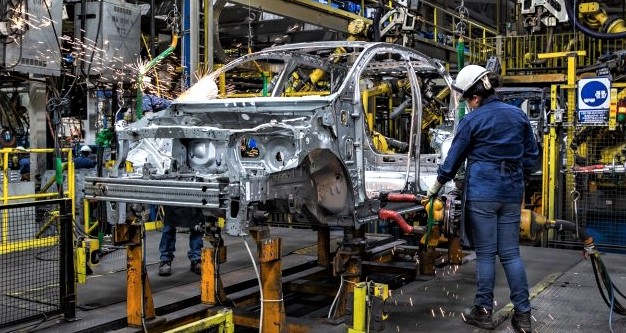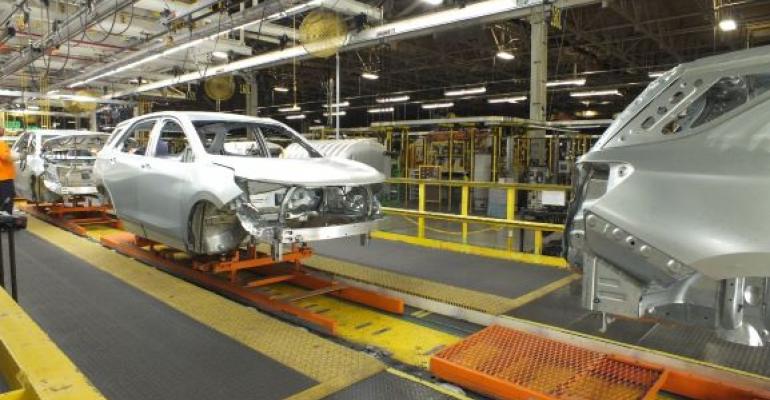OTTAWA – The Canadian automotive sector is seeking a swift resolution in its favor of a disputes hearing launched by its government with Mexico against the U.S. over what automobiles are covered by the U.S.-Mexico-Canada (USMCA) trade agreement.
The USMCA includes detailed rules on the proportion of parts and materials that must be sourced from within the three countries for it to be covered by the agreement’s duty-free and other trade-facilitation provisions. Canada and Mexico argue the U.S. is being overly demanding about North American sourcing, creating a risk that some Canadian and Mexican-made autos are not covered by the USMCA when exported to the U.S., and hence subject to duty.
Brian Kingston, president and CEO of the Canadian Vehicle Manufacturers’ Assn., which represents the Detroit Three automakers in Canada, says he hopes for a “clear ruling in favor of Canada’s position and a quick adjustment to bring the agreement into line” in terms of the U.S. government’s position.
“The faster the better,” he says. “We negotiated an agreement with a common understanding and interpretation of the agreement; now there’s differing interpretations. It’s important we have the same understanding through the implementation process.”
This is especially important given the U.S., Mexico and Canada “have an integrated market and we build things together,” Kingston (pictured, below left) says, adding agreement on common rules within the USMCA is designed to ensure the North American auto industry is competitive.
 One particular concern over a swift agreement of rules-of-origin terms is the fact the USMCA has a sunset clause saying that unless all three countries agree, the trade pact lapses after 16 years, which would be 2036.
One particular concern over a swift agreement of rules-of-origin terms is the fact the USMCA has a sunset clause saying that unless all three countries agree, the trade pact lapses after 16 years, which would be 2036.
The stakes are particularly high for the Canadian industry, given cars and trucks were Canada’s second-largest export by value at C$42.9 billion ($33.7 billion) in 2020, of which 93% was exported to the U.S., according to CVMA data. As for auto parts, according to business information service Statista, Canadian exports to the U.S. were worth $8.1 billion in 2020.
The dispute focuses on the fine print of the trade deal’s rules of origin, which say 75% of a vehicle’s parts and materials by value must be sourced in the three USMCA countries for it to be covered by the agreement. There is complexity over parts, especially, with “core parts” and “super core parts” given different weight in the rules-of-origin formula.
Canada and Mexico claim that if 75% of such key car components (as listed in the agreement) are produced within the USMCA bloc, then they can be considered 100% made in North America when assessing local content in an assembled vehicle.
The American government does not agree with this rounding up – if its interpretation is followed, says Arun Alexander, Canada’s deputy minister for trade policy and negotiations, this “could significantly inhibit the ability of certain Canadian manufacturers to qualify their motor vehicles for duty-free trade in North America.”
In a message filed with the USMCA secretariat, Alexander says, “Canada considers that the United States is incorrectly interpreting provisions in the (USMCA) regarding the relationship between the core parts and vehicle regional value content calculations.”
As a result, Canada is supporting Mexico’s launch of an “Article 31” action under the USMCA trade disputes resolution, with a hearing anticipated in the summer. Under this procedure, if a USMCA panel rules against the U.S., and Washington does not reform its auto trade rules, both Canada and Mexico would have the right to remove trading rights from the U.S. under the trade agreement. These would have to cost U.S. exporters as much as the losses incurred by Canadian and Mexican exporters because of the disputed auto parts rules.

GM’s San Luis Potosi, Mexico, plant also assembles Chevrolet Equinox.
David Adams, Global Automakers of Canada CEO and president, says the problem might especially hit Canadian battery production and exports, but he calls the dispute “a general problem” threatening the ability of the entire Canadian auto and parts sector to sell vehicles and components to the U.S.
“The interpretation the Americans are holding to increase the (USMCA production) requirements (is) opposed to what the Canadian and Mexican governments and all three countries’ automotive industry thinks is the case,” he says: “We all share the same perspective that the interpretation by the U.S. government do not reflect the words in the agreement.”
The problem, Adams says, is that the previous and current U.S. administrations “want to ensure that more and more of a vehicle is produced not only in North America but in the USA specifically.”
He says all parties hope the dispute will be resolved before the end of the year.





